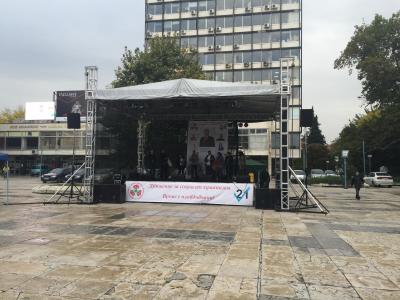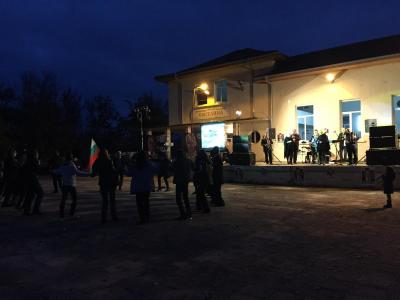Today’s mayoral election in Plovdiv is a big deal, at least to somebody. Maybe elections are always welcomed here with great fanfare, or maybe it’s because whoever is selected today will serve during 2019 – the year for which Plovdiv has been named European Capital of Culture – but regardless, for at least the past two weeks it has been impossible to walk down the main pedestrian boulevard without being bombarded by campaign lit. Pamphlets, fliers, newspapers, and even balloons with party numbers printed on their sides have been distributed to passersby from tents and stands big and small.[1] With 16 different tickets in the running, the candidate pool is even bigger than that of US Republicans currently vying for nomination.
One thing that has been particularly interesting me is the way in which music and dance are incorporated into the campaign strategies of various tickets. The pamphleteering slowed to a trickle by the second half of this week, but it appears instead to have been replaced by combinations of speeches and performances. I encountered three of these this week, but there were likely more.

It was like a festival – there was bright pink cotton candy, deep-fried donut-like pastries dribbled with chocolate sauce, and adults and children of all ages milling around. After the speeches, a wedding band set up to play. When all of the spectators (probably between 100-200 of them, though I’m a bad judge) dispersed from the center of the square, I wondered if they had truly been there for the speeches and had no interest in the performance. But few people actually left; rather, they lined the edges of the square and even crossed to the other side of the street.
I soon knew why. The two singers, accordion, clarinet, sax, violin, and drum kit blasted through the speakers at such a volume that I fell asleep hours later still feeling as though somebody had stuffed cotton into my ears. The politicians then started a horo line in the square, with the lead candidate at the front holding a Bulgarian flag, which he waved as the dancers weaved around to the same basic step for at least the next 40 minutes without stopping. At its peak, 15 or so minutes after the dancing began, the line included about 50 people. Most of the dancers were women, while most men watched from the sidelines. Children as young as five attempted to imitate the adults’ footwork (when they weren’t running around making mischief, that is).
People appeared to choose to join the line next to friends, though there was not much conversation between those who were dancing. Several people joined the line in places near the candidates, which could have been a show of support or enthusiasm. In general, I am not sure whether those gathered in the square were there for the entertainment, to learn about the candidates, or because they actually supported the party. Though I’m usually quite keen to join a horo, I chose not to because of the political nature of the event (especially because I did not want to unintentionally, as a result of my linguistic incompetence, demonstrate support for ideas to which I may be opposed).
On Friday afternoon, I encountered a third such event as I left school for the day. I had a few minutes before my next appointment, and hearing music, I followed my ears behind the Academy to the viewpoint overlooking the Roman Amphitheater. There was a cluster of about ten “Security Police” officers consulting about something above the stairs that led down into the theater. On the amphitheater stage, a huge setup had been concocted in support of the incumbent mayor and his center-right party, GERB. (Bulgaria’s current Prime Minister, Boyko Borisov, is also a member of this party, whose name translates to something like Citizens for European Development of Bulgaria.) On the stage, an ensemble of about 20 women and teenage girls was rehearsing a folk dance to a recorded track. The conclusion of the dance included hand gestures similar to jazz hands and a recorded voice that said something along the lines of “For Bulgaria.”
This week has been one of the most frustrating for me in terms of not understanding more Bulgarian. For example, would it be possible to determine whether certain of these approaches to music and dance (ensemble type, performance versus participatory dance, etc.) appeal more to certain parties for particular reasons? Would a more nationalistic, anti-immigrant party favor folk instruments while a progressive group would welcome wedding bands, with their history of Roma inclusion and influence? Would a ticket on the left choose a horo while a party to the right would choose a choreographed performance? Or vice versa? Or are there no such associations? Do all of the parties have performances like these, or is it only a select few? Do the musicians support the parties for whom they perform, or is it to them just another gig? Do all of the performances feature music that could be deemed “Bulgarian,” or are other musics (classical, pop, etc.) also used by some parties?
I will keep you updated if I find any answers…
[1] I don’t know much about how the political system here works, but through observation I have guessed that each party proposes a ticket with a different candidate for each post. I’m not sure how that plays out after votes are cast – is it all or nothing for each party, or is there some mix-and-match depending on results?
